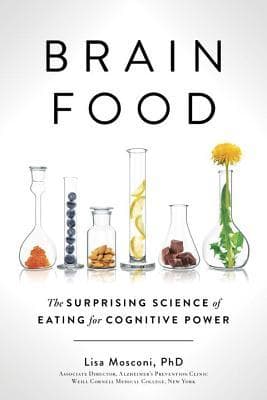
Book Review Summary: Brain Food: The Surprising Science of Eating for Cognitive Power
Introduction
"Brain Food: The Surprising Science of Eating for Cognitive Power" by Lisa Mosconi is a book that explores the connection between nutrition and cognitive function. Mosconi, a neuroscientist and certified integrative nutritionist, presents a comprehensive approach to brain health, challenging common dietary advice and offering practical recommendations based on scientific research. With a focus on the unique nutritional needs of the brain, this book provides readers with a comprehensive plan for optimizing cognitive power and preventing cognitive decline.
About Lisa Mosconi
Lisa Mosconi is a neuroscientist, certified integrative nutritionist, and holistic healthcare practitioner with extensive experience in brain science, the microbiome, and nutritional genomics. She holds a dual PhD in neuroscience and nuclear medicine and serves as the associate director of the Alzheimer's Prevention Clinic at Weill Cornell Medical College/New York-Presbyterian Hospital. Mosconi has made significant contributions to the field of brain health, and her expertise in both neuroscience and nutrition makes her a reliable source of information on this subject.
Analysis of Views
-
Holistic Approach: Readers appreciate the holistic approach taken by Mosconi in "Brain Food." She considers the interplay between nutrition, lifestyle choices, and genetics in determining cognitive health. This comprehensive approach sets the book apart from other dietary guides that focus solely on specific foods or nutrients.
-
Scientific Evidence: Many readers praise the book for its strong scientific foundation. Mosconi provides extensive research and evidence to support her recommendations, making it a reliable source of information for those seeking a deeper understanding of the relationship between nutrition and cognitive function.
-
Practical Recommendations: The book offers practical advice on what to eat and avoid, making it accessible to readers who want to incorporate brain-boosting foods into their diets. The inclusion of a detailed quiz and 24 recipes adds value to the book, allowing readers to apply the knowledge they gain from reading it.
-
Debunking Misconceptions: "Brain Food" challenges common misconceptions about diet and cognitive health. For example, it debunks the idea that the paleo diet is ideal for everyone and highlights the importance of avoiding gluten for some individuals. This critical examination of popular dietary trends adds depth to the book's content.
-
Easy-to-Read Style: Readers appreciate the book's accessible writing style, which makes complex scientific concepts easy to understand. Mosconi's ability to communicate complex ideas without sounding preachy is commended by many readers, making the book accessible to a wide audience.
Reasons for Recommendation
-
Comprehensive Approach: The book's holistic approach to brain health sets it apart from other dietary guides. By considering lifestyle choices and genetics in addition to nutrition, "Brain Food" offers a more complete picture of cognitive function.
-
Strong Scientific Foundation: The inclusion of extensive research and evidence-based recommendations makes "Brain Food" a reliable source of information for those seeking a deeper understanding of the relationship between nutrition and cognitive function.
-
Practical Recommendations: The book provides practical advice on what to eat and avoid, making it easy for readers to incorporate brain-boosting foods into their diets. The inclusion of a detailed quiz and 24 recipes adds value to the book, allowing readers to apply the knowledge they gain from reading it.
Reasons for Not Recommendation
-
Limited Applicability: Some readers feel that the book may not be applicable to everyone due to its focus on specific foods and nutrients. While this approach may be beneficial for certain individuals, it may not be practical or feasible for others who have limited access to certain ingredients or cannot afford organic produce.
-
Lack of Evidence for Controversial Claims: While "Brain Food" offers strong scientific evidence to support its recommendations, some readers feel that certain claims, such as the superiority of organic and non-GMO produce, are not adequately supported by evidence. This lack of clarity can leave readers questioning the validity of certain claims made in the book.
Conclusion
"Brain Food: The Surprising Science of Eating for Cognitive Power" by Lisa Mosconi is a comprehensive guide that explores the connection between nutrition and cognitive function. With its holistic approach, strong scientific foundation, practical recommendations, and debunking of common misconceptions, this book offers valuable insights into the role of nutrition in brain health. While some readers may find certain aspects limiting or lacking in evidence, overall, "Brain Food" is recommended for those seeking a deeper understanding of the relationship between nutrition and cognitive function and looking for practical advice on how to optimize their brain health through dietary changes.